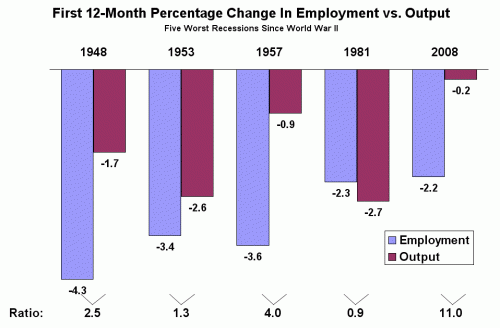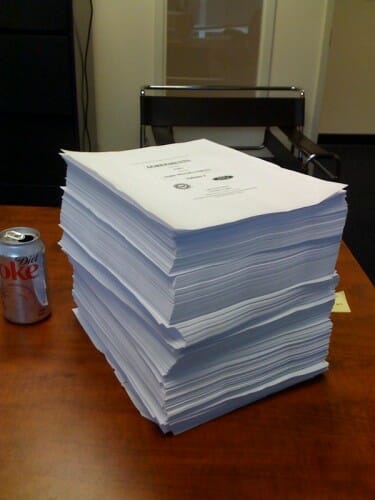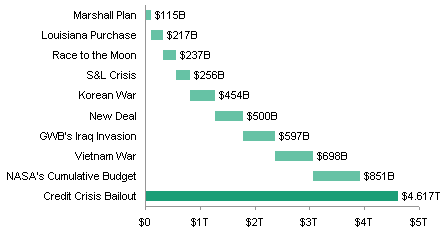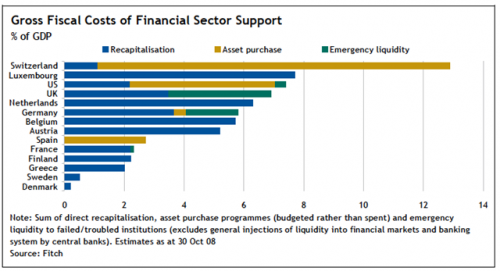Some Thoughts on the Chrysler Restructuring Plan
The Chrysler web page for their restructuring plan they presented to the Feds is here. The summary pdf my comments are based on is here. Thoughts:
- It is criminal that this is going to Congress, not a bankruptcy judge. This is a conspiracy of management (looking to hold onto their jobs and equity), equity holders, and employees to usurp value from the senior debt holders, who would normally be first in line in a bankruptcy.
- There is no WAY I, as a private investor, would put one additional dime into Chrysler based on this plan. All the Same-Old-Incremental-Sh*t, with no explanation of what they are going to do differently. Somehow they are going to cut half their models and lay off tens of thousands of employees but hold fast on market share, somehow reversing years of steady decline. No explanation of how.
- In section one, they blame it all on the credit markets. Specifically, the lack of ability of the Chrysler finance arm to lend to customers. But I showed the other day that consumer lending is still strong by banks. What they are really saying here, but they are smart enough not to utter the actual words, is that their sales depended on a finance arm that was willing to lend at below-market rates to people with bad credit scores, and the lack of this hidden subsidy is what is making it hard to sell their cars. Credit exists -- what no longer exists is zero-percent-interest-to-anyone-who-walks-in-the-door-no-questions-asked financing. Instead of figuring out how to make cars that don't require hidden subsidies to get off the lot, they are trying to get the government to fund their hidden subsidies.
- The present value calculation is a joke. I could spend 3-4 business school classes discussing problems with it, so I won't now. But one element that stuck out at me was that they come up with a terminal value in the calculation as a multiple of EBITDA (Earnings before Interest, Taxes, Depreciation, and Amortization). Really? EBITDA is a common metric, but it is beyond meaningless when looking at a company going bankrupt under the weight of interest costs and capital spending. Besides, they have the gall to assume that net cash flow (excluding financing activities) will be positive for the combined years 2009-2010. Im-freaking-possible. Remember, if any private investor in the country believed these numbers, Chrysler wouldn't have to be begging at Congress's door. Congress is their last chance to find a sucker who will give them more money.
- OK, I can't totally leave aside the NPV calculations yet. They have a table of NPV's at different rates of return (which is meaningless because their cash flow assumptions can't be believed). The rates of return are 5%, 10%, 15%, and 20%. This is ridiculous, though many may not recognize it. 20% is a low rate for the discounting of about any large equity investment, but it is absurdly, ridiculously low for a high-risk investment in a company that has been burning cash for decades and is facing its second near bankrupcy in 30 years. Any savvy investor in the world would smell a dead fish here, but Congress won't because Chrysler is waiving electric cars at them
- And speaking of electric cars, any intelligent restructuring plan would recognize that electric cars, even if they are successful in the marketplace, are not going to be anything but a cash drain for years. This kind of thing has to be put on hold while the company gets back on its feet. But instead, since this is a political and not a business document, Chrysler is practically leading with it. In fact, the sections "4: Commitment to Energy Security and Environmental Sustainability", "5: Compliance with Fuel Economy Regulations," and "6: Compliance with Emissions Regulations" all come in priority order ahead of "7: Achieving a Competitive Product Mix and Cost Structure." In fact, this section about costs and competitive products comes dead last in the plan. LOL, a "business" plan, indeed.
- I thought it was funny that on the cover of the report, they have all kinds of happy politician-grabbing stats about how many red-blooded Americans they employ and how much of their production is made in the good old USA. But their entire restructuring plank #3, which is labeled "strategic alliances," seems to boil down to a bunch of outsourcing to foreign partners. Which is fine with me, but probably would freak out the Dems they are selling it to should they figure it out.
In the new corporate state, this is what business plans will look like. Because were aren't selling returns and wise investment of capital, we are selling the care and feeding of political constituencies and pressure groups.
Postscript: OK, I realize I criticized the plan without suggesting what should be in it. Here is what I would demand as an investor: An achnowlegement and discussion of the reasons for past market share slide, and targeted actions to reverse these trends. As Chrysler has said they have been working on this problem for 30+ years, the proposed solutions will need to sound radical, not incremental. Further, they need to stop complaining that below-market rate consumer financing does not exist, and explain how they are going to sell cars at a price that covers their costs as well as a return for shareholders.


 Postscript: To be fair, economists who look at this stuff much more deeply were calling out deep problems long before Paulson screamed fire in a crowded movie house (
Postscript: To be fair, economists who look at this stuff much more deeply were calling out deep problems long before Paulson screamed fire in a crowded movie house (



